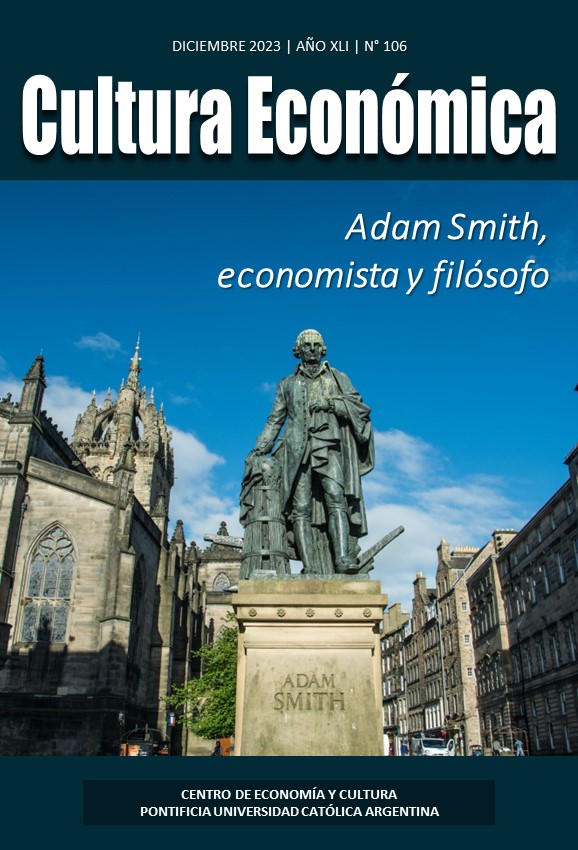An archaeology of Adam Smith’s thought according to the medieval economy and its modern heritage
DOI:
https://doi.org/10.46553/cecon.41.106.2023.p23-41Keywords:
Adam Smith, market, law, modernityAbstract
This article aims to put to the test Michel Foucault’s diagnosis about the thought of Adam Smith (1723-1790) as being part of the structure of Life, Labour and Language proper to the modern episteme. In order to question Foucault’s hypothesis, the text puts forward a medieval archaeology of modern economy, calling the attention on the medieval Franciscans and their ideas about the market and the law. As far as this point is concerned, several medieval Franciscan thinkers are taken into account amongst which the doctrines of Pedro de Juan Olivi stand out. Finally, we carry out a reflection about the validity of the triple structure advanced by Foucault regarding Smith in contrast with the present times of economic globalization.
Downloads
References
Agamben, G. (2007). Il Regno e la Gloria. Per una genealogia teológica dell’economia e del governo. Neri Pozza.
Agamben, G. (2011). Altissima povertà. Regole monastiche e forma di vita. Neri Pozza.
Berry, C. J. (1974). Adam Smith’s considerations on language. Journal of the History of Ideas, 35(1), 130-138.
Böhl, M. (2007). Das Christentum und der Geist des Kapitalismus. Die Auslegungsgeschichte des biblischen Talentegleichnisses. Böhlau Verlag.
Borisonik, H. (2017). $oporte. El uso del dinero como material en las artes visuales. $upport. Money as material en visual arts. Miño y Dávila Editores.
Boulder, M. (2002) Extinction. The Evolution and the End of Man. Columbia University Press
Buenagracia de Bergamo (1929). Tractatus de Paupertate Christi et apostolorum, Archivium Franciscanum Historicum. Edición de L. Oliger, número 22, 486-511.
Burr, D. (2001). The Spiritual Franciscans. From Protest to Persecution in the Century after Saint Francis. Pennsylvania State University.
Canguilhem, G. (1965). La connaissance de la vie. Vrin.
Chomsky, N. (2014). The end of History? The short, strange era of human civilization would appear to be drawing to a close. In these times. Septiembre 2014, 1-3.
Coccia. E. (2006). Regula et vita. Il diritto monastico e la regola francescana. Medioevo e Rinascimento, XX, 97-147.
Coccia, E., & Grau, D. (2018). The Transitory Museum. Polity Books.
D’Ockham, G. (1963). Opus nonaginta dierum (Edición de Ralph Francis Bennet y Hilary Seton Offler). Manchester University Press.
Fleischacker, S. (2004). On Adam Smith’s Wealth of Nations: A Philosophical Companion. Princeton University Press.
Foucault, M. (1966). Les mots et les choses. Une archéologie des sciences humaines. Gallimard.
Foucault, M. (1975). Surveiller et punir. Naissance de la prison. Gallimard.
Foucault. M. (2004). Naissance de la biopolitique. Cours au Collège de France. 1978-1979 (Edición de Michel Senellart). Gallimard-Seuil.
Grossi, P. (2000). Il dominio e le cose. Percezioni medievali e moderne dei diritti reali. Giuffrè.
Grundmann, H. (1935). Religiöse Bewegungen im Mittelalter. Emil Ebering.
Hegel. G. W. F. (1986). Werke in 20 Bänden mit Registerband. Band 7: Grundlinien der Philosophie des Rechts oder Naturrecht und Staatswissenschaft im Grundrisse. Mit Hegels eigenhändigen Notizen und den mündlichen Zusätzen. Suhrkamp Verlag.
Juan XXII (1671). Ad conditorem canonum. Corpus Iuris Canonici. Johannis Antonii Hugvetan - Guillielmi Barbier.
Lambert, M. (1998). Franciscan Poverty. The Doctrine of the Absolute Poverty of Christ and the Apostles in the Franciscan Order, 1210-1323. The Franciscan Institute.
Lambertini, R. (1990). Apologia e crescita dell’identità francescana (1255-1279). Istituto storico italiano per il Medioevo.
Langholm, O. (1992). Economics in the Medieval Schools. Wealth, Exchange, Value, Money and Usury according to the Paris Theological Tradition. Brill.
Ludueña Romandini, F. (2010). La comunidad de los espectros I. Antropotecnia. Miño y Dávila Editores.
Mäkinen, V. (2001). Property Rights in the Late Medieval Discussion on Franciscan Poverty. Peeters.
Noonan, J. (1957). The Scholastic Analysis of Usury. Harvard University Press.
Norman, J. (2018). Adam Smith. Father of Economics. Basic Books.
Olivi, P. (2012). Tractatus de contractibus (Edición de Sylvain Piron). Les Belles Lettres.
Perrot, J-C. (1992). Une histoire intellectuelle de l’économie politique (XVIIe-XVIIIe siècles). Éditions EHESS.
Potestà, G. L. (1990). Angelo Clareno dai poveri eremiti ai Fraticelli. Istituto storico italiano per il Medioevo.
Reisman, D. (1998). Adam Smith on Market and State. Journal of Institutional and Theoretical Economics (JITE) / Zeitschrift für die gesamte Staatswissenschaft, 154(2), 357-383.
Rifkin, J. (2004). La era del acceso. La revolución de la nueva economía. Paidós.
Rose, N. (2006). The Politics of Life Itself. Biomedicine, Power, and Subjectivity in the Twenty-First Century. Princeton University Press.
Schütz, A. (1995). L’immaculée conception de l’interprète et l’emergence du système juridique: à propos de fiction et construction en droit. Droits, (21), 113-126.
Smith, A. (1761). Considerations concerning the First Formation of Languages, and the Different Genius of Original and Compounded Languages. The Philological Miscellany I, 440-479.
Smith, A. (1975). The Glasgow Edition of the Works and Correspondence of Adam Smith. Volume 2: An Inquiry into the Nature and Causes of the Wealth of Nations (Edición de W. B. Todd). Oxford University Press.
Thomas, Y. (2002). La valeur des choses. Le droit romain hors la religion. Annales. Histoire, Sciences Sociales, (6), 1431-1462.
Tierney, B. (1972). Origins of Papal Infallibility, 1150-1350. A Study on the Concepts of Infallibility, Sovereignty and Tradition in the Middle Ages. Brill.
Todeschini, G. (2008). Richesse franciscaine. De la pauvreté volontaire à la société de marché. Verdier.
Downloads
Published
How to Cite
Issue
Section
License

This work is licensed under a Creative Commons Attribution-NonCommercial-ShareAlike 4.0 International License.













